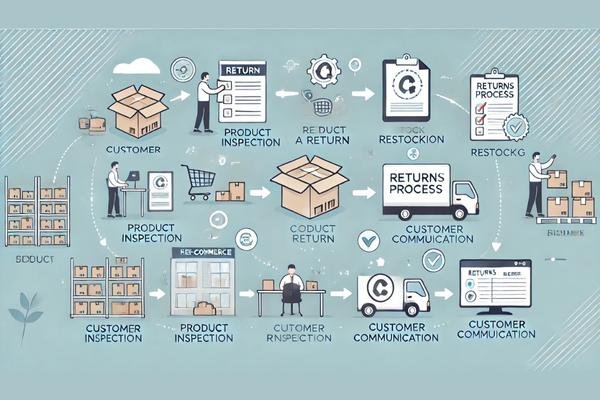
Top 5 Packaging Solutions to Protect Products in 2025
October 29, 2024
Top 10 Cloud Storage Solutions for Businesses in 2025 : Essential Picks for Marketers, Developers, and Content Creators
November 1, 2024How to Choose the Best Fulfillment Partner for Your Online Store
In the fast-evolving e-commerce landscape, having a reliable order fulfillment partner is crucial for growth. A well-chosen fulfillment partner can help streamline operations, enhance customer satisfaction, and boost profitability. But with a variety of options available, how can e-commerce business owners select the best fit? This guide breaks down the essential criteria to help you choose the ideal order fulfillment partner for your online store.
Table of Contents
1. Understanding the Role of an Order Fulfillment Partner
Order fulfillment is the backbone of any successful e-commerce business. It involves the complete process from inventory storage to packaging, shipping, and handling returns. An order fulfillment partner essentially becomes an extension of your business, handling these tasks so you can focus on growing your brand. Here’s why choosing the right partner is vital:
- Efficiency and Scalability: They enable efficient inventory management and quick order processing, allowing you to scale up as demand grows.
- Customer Satisfaction: A reliable partner ensures timely deliveries and well-packaged products, boosting customer experience.
- Cost Management: Outsourcing fulfillment can lower operational costs by reducing the need for storage, equipment, and labor.
2. Types of Order Fulfillment Services
Understanding different types of fulfillment models is key to making the right choice. Here are the main options:
a. In-House Fulfillment
In-house fulfillment refers to managing all logistics internally, from storage to shipping. While this allows complete control, it’s resource-intensive and may not be scalable for growing businesses.
b. Third-Party Fulfillment (3PL)
In a third-party fulfillment model, an external provider manages inventory, packaging, and shipping. This is ideal for small to mid-sized e-commerce businesses, as it enables them to scale without heavy investment in infrastructure.
c. Dropshipping
Dropshipping allows businesses to sell without keeping inventory. Orders are fulfilled directly by the supplier, reducing upfront costs. However, this model limits control over fulfillment quality.
d. Hybrid Fulfillment
This approach combines multiple methods to accommodate different product lines or customer requirements, offering flexibility in fulfillment management.
3. Key Factors to Consider When Choosing a Fulfillment Partner
Selecting the right fulfillment partner involves assessing several critical factors to ensure they align with your business needs. Here’s what to consider:
a. Location and Shipping Speed
Shipping time significantly impacts customer satisfaction. A fulfillment center close to your main customer base can reduce delivery times and lower shipping costs.
b. Technology and Integration
Look for partners that provide seamless integration with your e-commerce platform (e.g., Shopify, WooCommerce, Amazon). Real-time data synchronization and tracking are crucial for inventory management, order processing, and customer updates.
c. Cost Structure
Costs can vary widely among fulfillment partners. Typical fees include receiving, storage, picking, packing, and shipping. Analyze each cost carefully to avoid unexpected charges, and ensure the pricing aligns with your budget and order volume.
d. Scalability and Flexibility
Your fulfillment needs may change as your business grows. Choose a partner with flexible solutions that can handle both seasonal demand and long-term scaling without compromising service quality.
e. Returns Management
An efficient returns process is essential for customer retention. Ensure the fulfillment partner has a streamlined returns system, offering prompt processing and clear communication with customers.
f. Customer Support and Reliability
Partnering with a company that provides responsive customer support can make a significant difference, particularly during peak seasons or unexpected challenges.
4. Top Fulfillment Partners and Their Unique Strengths
a. Amazon FBA (Fulfillment by Amazon)
- Pros: Massive distribution network, fast shipping through Prime, competitive pricing for small items.
- Cons: Higher fees for certain products, limited branding opportunities, strict storage limits.
b. ShipBob
- Pros: User-friendly interface, multiple warehouses, fast and flexible shipping options.
- Cons: Pricing may be higher for smaller businesses, limited international reach.
c. Shopify Fulfillment Network
- Pros: Seamless integration with Shopify stores, flexible pricing, personalized branding options.
- Cons: Limited availability outside of North America, primarily suited for Shopify users.
d. FedEx Fulfillment
- Pros: Established network, competitive international shipping rates, strong customer support.
- Cons: Higher costs for smaller packages, variable pricing based on shipping zones.
5. Benefits of Choosing the Right Fulfillment Partner
A strategic fulfillment partner can bring multiple advantages to your e-commerce business. Here are some of the key benefits:
- Improved Efficiency: A reliable partner handles logistics, allowing you to focus on business growth.
- Enhanced Customer Experience: Faster delivery times and well-handled returns improve customer satisfaction.
- Cost Savings: Outsourcing fulfillment can lower operational expenses by reducing the need for warehousing and manpower.
- Scalability: A good partner will offer scalable solutions to match your business growth.
- Access to Advanced Technology: Leading fulfillment providers offer tech solutions that help with real-time tracking, forecasting, and inventory management.
How to Choose the Best Fulfillment Partner for Your Online Store Recap
Top Fulfillment Partners for Your Online Store
Explore the features, pros, and cons of the leading fulfillment partners to help you decide the best fit for your e-commerce business.
| Fulfillment Partner | Key Features | Pros | Cons | Learn More |
|---|---|---|---|---|
| Amazon FBA | Prime shipping, vast distribution network | Fast delivery, competitive rates | Higher fees, limited branding | Visit Amazon FBA |
| ShipBob | Multiple warehouses, real-time inventory tracking | User-friendly interface, scalable | Higher costs for small businesses | Visit ShipBob |
| Shopify Fulfillment Network | Seamless Shopify integration, custom branding | Flexible pricing, ideal for Shopify users | Limited to Shopify stores | Visit Shopify Fulfillment |
| FedEx Fulfillment | Global network, competitive shipping rates | Strong international reach, reliable support | High costs for small packages | Visit FedEx Fulfillment |
| Deliverr | 2-day delivery guarantee, multi-channel integration | Flat-rate pricing, fast shipping | Limited customization | Visit Deliverr |
6. Frequently Asked Questions
1. What are the key factors to consider when choosing an order fulfillment partner?
To choose the best order fulfillment partner, consider factors like location, technology integration, cost structure, scalability, returns management, and customer support.
2. How does a 3PL provider differ from in-house fulfillment?
A 3PL provider handles logistics externally, which reduces the need for in-house infrastructure and staff. In-house fulfillment, on the other hand, allows more control but can be costly and time-consuming.
3. Can a small business benefit from a fulfillment partner?
Yes, a fulfillment partner allows small businesses to scale operations without investing heavily in storage or logistics, enabling them to focus more on growth and customer engagement.
Conclusion
Choosing the best order fulfillment partner for your e-commerce store can greatly impact your business’s success. Whether you’re looking for speed, cost-efficiency, or a partner who can grow alongside you, carefully evaluating potential partners based on the above factors will help you make a well-informed decision. Selecting the right fulfillment partner doesn’t just streamline your logistics but also sets the foundation for a seamless customer experience and long-term business growth.








